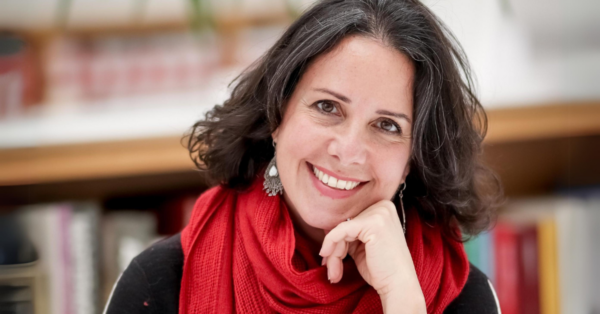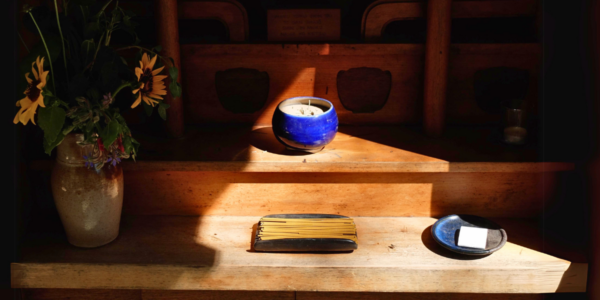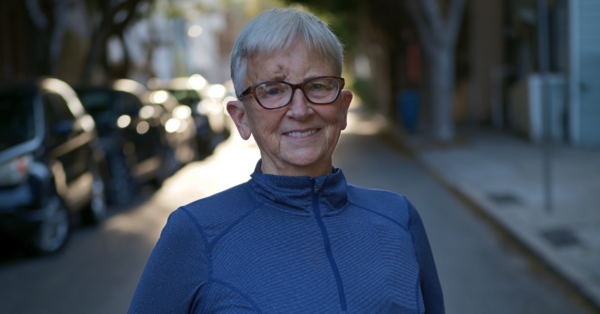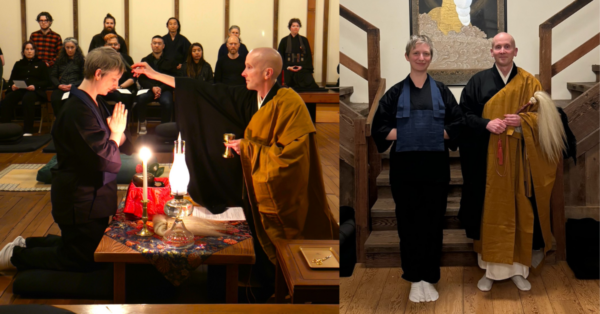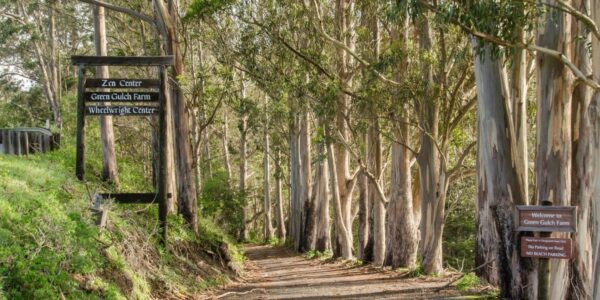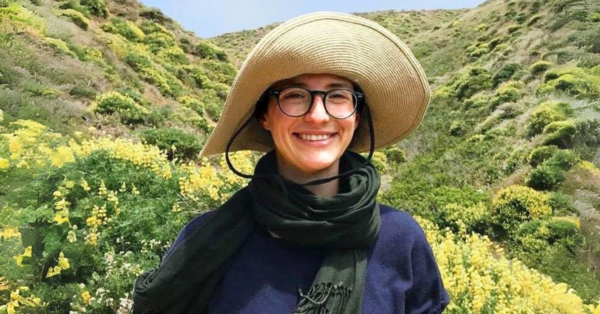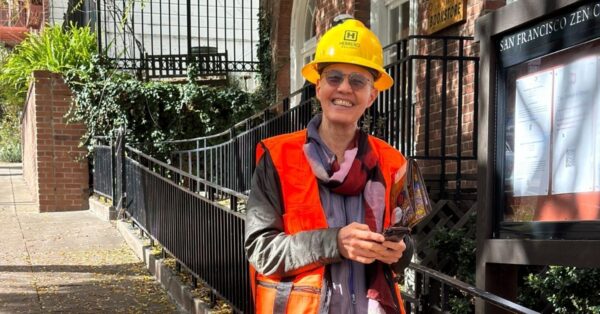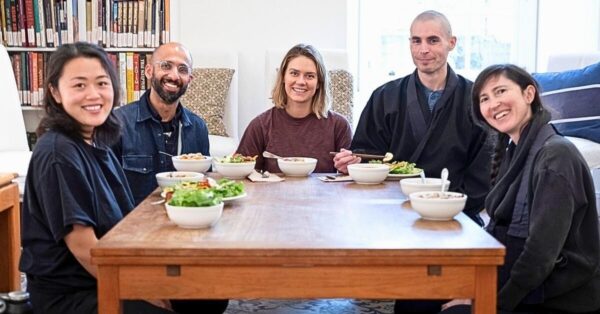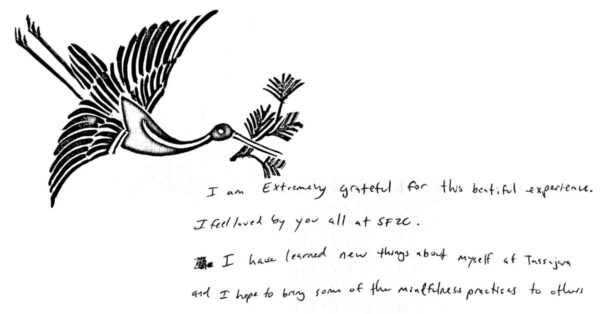Most times the most precious parts of ourselves are dwarfed by a preoccupation with mundane, functional tasks that fill our days and thoughts. I’m talking about kindness, love and joy—our humanity. But when we hit a wall, we sometimes stop and invert the paradigm, putting our humanity first, our to-do list second.
In this interview, sangha member Denise Shephard shares her story of Establishing the Path of Practice (EPP). It is a singular and universal story of attempting to invert the paradigm.
How did you come to participate in EPP?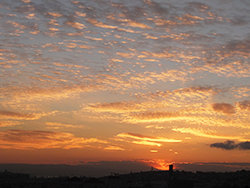
I started coming to Zen Center when I hit a number of different roadblocks in my life. Things were not working the way they used to. I think life allows you more than a few strikes, just like in baseball. Then something happens as you mature and get older; more is expected of you. I found the way I thought I behaved and the way I actually behaved were not the same. This made my life much more difficult and confusing.
I had ended a long relationship. I was thinking about going to therapy to fix myself. I kept thinking something’s not working here. I began to realize that the quality of most of my relationships were not as rich as I wanted. That was a big realization but nothing compared to comprehending that I felt helpless to fix this.
I think of a phrase Paul Haller attributed to Gil Fronsdal, the “bedside bookstand Buddhist.†I had Pema Chödrön books that I read and they really spoke to me. But I didn’t know how to take the life I had and apply what she was saying in realtime. They were in two different silos. I could read Pema and then I would go out to do something and tell myself, I want to be patient. I want to practice good speech habits. But I don’t think I have the capacity to act this way.
So that’s what prompted me to start an exploration.
Did your exploration start here at City Center?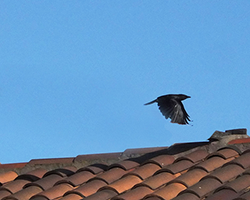
No, it started by driving all the way to Spirit Rock up in Marin. I have always been drawn to Sylvia Boorstein; she teaches there on Wednesday mornings. Sylvia is like Mother Earth—she attracts a loyal group of people that attend weekly, some of them for the past twenty years. It’s very welcoming. One time we sang “It’s a Wonderful World†together—not a dry eye in the house. Unfortunately I began to realize I wanted to participate more in the community, but I live in San Francisco and I wasn’t drawn to Insight Meditation.
Rather reluctantly I decided to try City Center mainly due to its proximity. I had a slight resonance with Zen. During the early 80s I had attended Sunday dharma talks at Green Gulch. I didn’t have an inkling of what was going on then, but there was something about it that attracted me—the physicality of the space, the chanting, the quiet. And that initial attraction stuck with me and drew me back to Zen Center at Page and Laguna.
I came to City Center for zazen instruction and by a beautiful stroke of synchronicity Tova Green was the person offering the teaching that day. Tova is just this amazing combination of love and steel. She is not a pushover, but she’s also really accepting and has an incredible capacity for being present. I recall pestering her with a bunch of questions, yet she seemed at ease responding to my pointed queries. So I said, Okay. I’m going to give this a whirl. In the lobby all of the flyers were out on the table and there was one announcing the EPP class starting in January 2009. I looked at the flyer and I thought, This looks really interesting and cheaper than therapy!
You seemed to realize that the solution for you was not just to tough it out or, like our parents might have told us as children, Be good and behave yourself.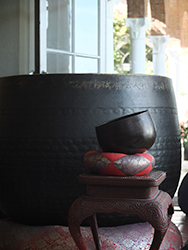
Yes, I had done my share of “toughing it out,†but I was aware that there was something stirring underneath all that. I might tell myself, Okay. I am going to bear down and I’m going to be patient. But, there’s a whole different quality to what Sylvia and Tova were doing. When I saw those women in real life, I could see they were not pretending, they were not struggling; they were applying something I could not grasp. The quality that they both had was this incredible acceptance and kindness towards every situation that they were in. Yet they were both so human; now I would say they acted like adults.
[For example,] Oh, the microphone doesn’t work. Oh, the room that we were supposed to go in isn’t working out. Oh, there’s no hot water. And it wasn’t as if they were faking it. It wasn’t like, There’s no hot water and I am just going to be this placid person. They could be upset, but there’s a way of being with the truth of the situation that they exhibited that showed me what was possible. That is possible. The way that Pema talked about it in her books is really possible.
So, I think what brought me to EPP was this realization that the way I was relating to my relationships, the work I was doing, the things I had to get done, the things I wanted to do, my aspirations were [all] coming from a very tight, small, hard place. And what I saw in these other people, Sylvia Boorstein, Tova Green and other people around Zen Center that I had contact with, was that they were not relating to it from this really frustrated, difficult place.
And I knew the minute I got to the [EPP] class that I felt a lot of hope that this teaching might help me embrace the mystery.
Do you recall what happened that first night that spoke to you?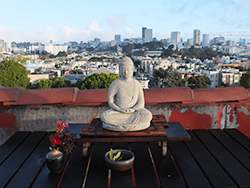
There was a wide variety of people some with a lot of experience with Buddhism. And then you had people like me and the people in my small group, who had a wide variety of different experiences. (My small group still meets every Thursday.) We had a couple of people who had practiced Zen, and others had practiced Insight Meditation. You had people who had meditated and then you had people for whom this was the first thing we had ever done.
I remember the teachers asked us to go around and talk about why we were there. And then one of the questions was what do you hope to get out of this. I want to become awake. I want to become this. I remember being intimidated by those people, because it was like, I don’t know if I want to become awake. I wanted to become more like Tova and more like Sylvia but still be me in some way. I wanted to have a greater capacity, but at the time I did not know that was part of what I wanted.
We started off with baby steps and a deep curiosity on the teachers’ part to understand what was in the way of us sitting every day, and whatever your individual situation was, that was addressed. It wasn’t like all of you are like this and you will all do it this way. There was this wonderful quizzical, curious, patient engagement in each person’s individual issues. And then they would go to the next person. And then at the same time, they would talk about their experience. So there was this individual focus and at the same time an overarching sense of we’re all in the same boat. And always this patience and joy and, well, love.
Paul Haller uses this word experiential a lot.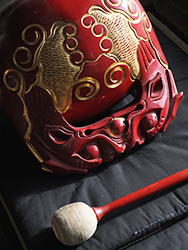
Yes, he does. He is an experiential teacher.
When he talked about zazen, he stripped it down to the most important aspects: your sitz bones, where your knees are, taking time to get comfortable on the cushion and just breaking down every single part of sitting, because it comes in your body. It’s not something you are reading in a book now. You are actually experiencing it on multiple levels. You have an intellectual understanding of what you are supposed to do, but now your body is participating in it. He also addressed the context of each person’s life and helped each of us work on strategies to increase the odds that we would sit.
You talked earlier about wanting to address issues like showing patience but not feeling you had the capacity to. Did this change for you?
Patience is not an easy thing. [For example] you’re standing in line, you’re hungry, you’re tired, but there are all these people in front of you. And you just want to go to the front of the line and get this thing over with to move on to the next thing. Before EPP I would have stood in that line and said, Okay how can I maneuver to get to the front of this line. I’m different from everyone else. I’m more special than everyone else.
Something that happens with the practices, the exercises, the homework is that without even realizing it intellectually, this internal capacity for waiting in that line imperceptibly changes, and it’s just not a big deal any more. Your capacity for difficult things increases in a massive way. Your ability to see that you actually aren’t alone and you really are truly connected to these other people in a whole new way is developed. It’s no longer an intellectual exercise, it’s just happening!
When I’m doing most things [now], even waiting in a line or doing something that might appear frustrating, I often feel that I am in a flow state, in the sense that it feels timeless, more and more. There’s more space. Everything feels more spacious.
Did you notice any other situations in which your capacity to be present increased?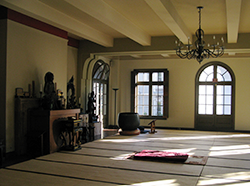
Oh yes, I had a greyhound dog, Agatha. She turned out to be an incredible teacher. My ex-partner wanted to adopt this greyhound and I thought it was nuts, because of the lifestyle that we had at that point. We were traveling a lot. Then when our relationship ended, I ended up with a dog I did not really want.
Still, I adapted to life alone with Agatha, but I didn’t have a heart connection with her at all. Now Agatha has quite a following and anyone reading this who experienced her would be somewhat shocked that I could not connect with this loving creature. I was dutiful: I took her for walks, I cared for her, I made sure she was fed and all of those things. Something happened during EPP where I actually fell in love with Agatha and had more of that connection than I’d ever had before—with people too. All of those exercises open you up to the nature that you already have, yet you may not be aware that it’s been there the whole time.
You talked earlier about reading some pretty fabulous teachers like Pema Chödrön, but not finding instructions on how to change.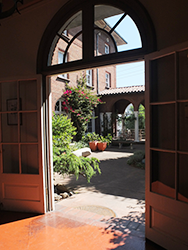
Pema Chödrön’s books are filled with wisdom, but it gets back to Paul and all the EPP teachers’ point that if you don’t ground this experientially somehow, it’s going to fly away. The minute the wind picks up, like leaves, it’s just going to be scattered.
The experiential piece of trying to do this in your life, figuring out that puzzle and being supported by teachers who are saying Yes, I know it’s hard. Let’s break this down. Let’s figure out why that’s not working for you. Something happens week by week by week that anchors this inside of you in your life, not in Zen Center, in your life so that you have the opportunity to apply this to new situations and to old situations.
It was interesting to hear people talk about when Thanksgiving came or an intense family situation arose. You’ve been practicing all this stuff and you’re like, Hey I think I’ve got this. I’m good to go. Then you’re plunged into your family or some other challenging situation, which really tests your ability to remain present and patient and loving and accepting, and to practice the speech that you’ve been practicing. You get an opportunity to work with all of the things that you are learning. It doesn’t mean you’re perfect. This isn’t about being perfect. It’s about trying. It’s about trying and not giving up and having this internal capacity to continue to try.
It’s such a personal training.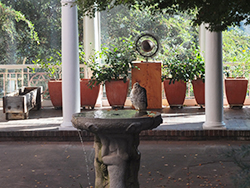
It’s incredibly personal! If all they did was have you meet in a large group and do that every couple of weeks, it wouldn’t work. It’s the combination of being in the large group with everybody, then you go off into a small group, and then the teachers encourage you to meet with them privately. All of those three levels support what you are trying to do with the exercises.
It seems that part of what the program offers is the opportunity to recognize your own transformation at the end of a yearlong journey.
Yes, and it develops through a couple of things, watching the teachers—their earnestness, their commitment. They show up for every class. They’re ready to engage with all of you no matter what’s going on. There’s something about that. They’re modeling in every interaction the qualities you’re developing.
I can remember sitting in a small group and one woman said, “But when I am sitting, I don’t know what to do with all these thoughts.” And before Paul could speak, because I’m a know-it-all, I said, “Oh here’s what you can do. I actually take those thoughts and put them aside. And then, when I do my walking I do them.”
Well, that’s not what Paul would have said, but he allowed that. He never made me feel bad. Instead he just continued to demonstrate, like water or wind demonstrates to a rock, this is the direction we are going in. He did it over and over again until something clicked for me.
And it clicked at different times and in different ways for all of us. We are all so unique, and that’s what I think is so valuable about this program. It really addresses the way we’re all the same and the way we’re all unique.
You said it clicked for you. Is it that you saw what you were doing?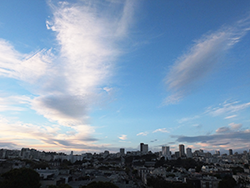
I saw it over a period of time. I did not see it in that moment. Before I started EPP I would have looked back on that moment with a lot of judgment: You dork, why did you do that? That’s how I would have viewed it if I realized what I had done. But I didn’t even realize it.
It was only later on when I saw Paul addressing a question that someone had that suddenly I realized I had stopped wanting to answer all of the questions. Suddenly I was actually more curious about what he was going to say or what this other person was saying. I began to notice that this need to have all the answers was something that was very strong in me. And there was something happening, as that need decreased. It’s not something I was trying to do. It’s just something that happened.
You didn’t go into the program thinking you really wanted to let go of the need to control every situation?
Not at all. If you had asked me in the beginning if I wanted to let go of controlling situations, I would have said, No, not so much. (laughter)
And it’s fine. It’s totally fine. Yes, that’s the thing about EPP. The things that happen as you’re doing this work are just kind of beautiful without you knowing ahead of time, these are all the things I want to fix. I didn’t realize how much I wanted to fix, so much of it just got fixed. (laughter)
If I pressed you to describe the process you went through, how would you break it down?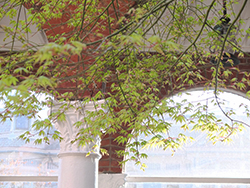
I would say that what EPP does is take a teaching and break it down into individual elements and support you in practicing it every day. You are observing the teacher each week, and then you have a homework exercise that is completely clued into what they talked about in that week. I remember one of our first exercises was to just observe how you put on your clothes. I remember sitting in the Buddha Hall hearing this and thinking, Oh my god, this is just going to be a total waste of time. These people are nuts! How is that going to help me with anything? (laughter)
And then you try to do it all week and you realize, Wow this is really hard! How come this is so hard? Then you come back with everybody who has been trying this exercise, and that’s all you talk about. You’re not talking about the Four Noble Truths. You’re not talking about DÅgen—you don’t even know DÅgen exists. You’re not talking about any of that stuff. You’re just doing this one, what seems like really small, thing and realizing, Wow this is really hard! And something happens as you break things down into these tiny, minute things and then you talk about it, in great detail . . . with people who are also talking about it in great detail. (laughter)
Something happens that I can’t explain. It’s like magic. But it is something that the EPP teachers know will happen because they’ve taken how they have learned this and broken it down into these very small exercises.
What was the teaching out of that exercise?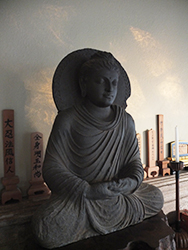
There is some foundational learning that happens that somehow brings me into my experience in the moment. And, that is sustained by the practices I learned in my body, in my voice, in my life, from Paul Haller, Christina Lehnherr, Anna Thorn, Linda Galijan and Dana Velden, the teachers for the 2009 EPP and my fellow travelers who I was lucky to learn with. I remain grateful for all their practice and for the opportunity to attend Zen Center.
Thank you so much for asking me to speak with you.
__________________________________________________________________________________
Establishing the Path of Practice (EPP) is a 12-week experiential training program designed to help participants develop a sustainable daily meditation practice and mindfulness of body, mind and emotions during everyday activities and relationships.
The 2016 EPP program begins September 24 at City Center and will be led by Urban Temple Dharma Teacher Ryushin Paul Haller with fellow Zen teachers.
(Interview conducted by Sachico Ohanks, SFZC Communications Coordinator. Photos by Shundo David Haye.)


